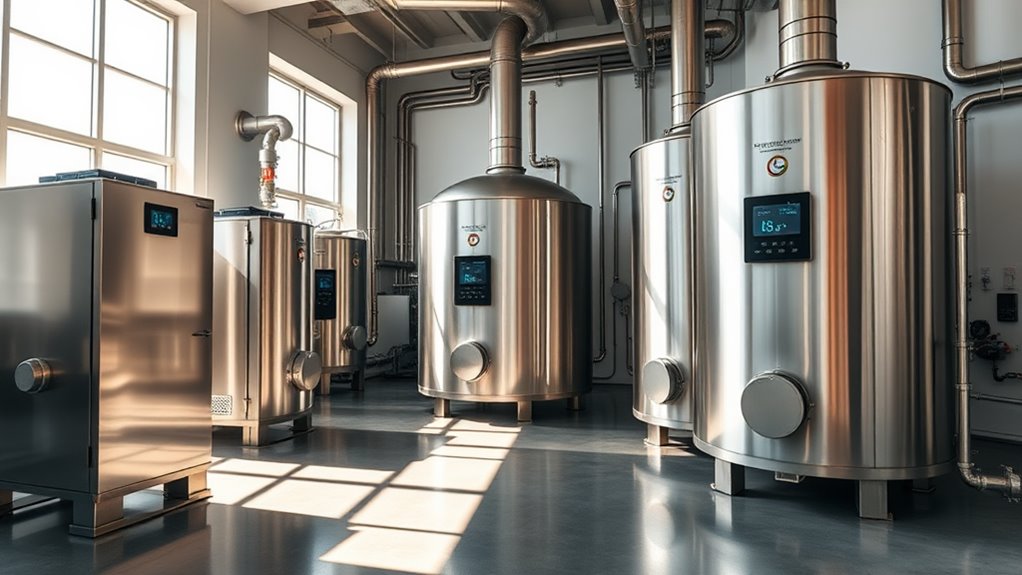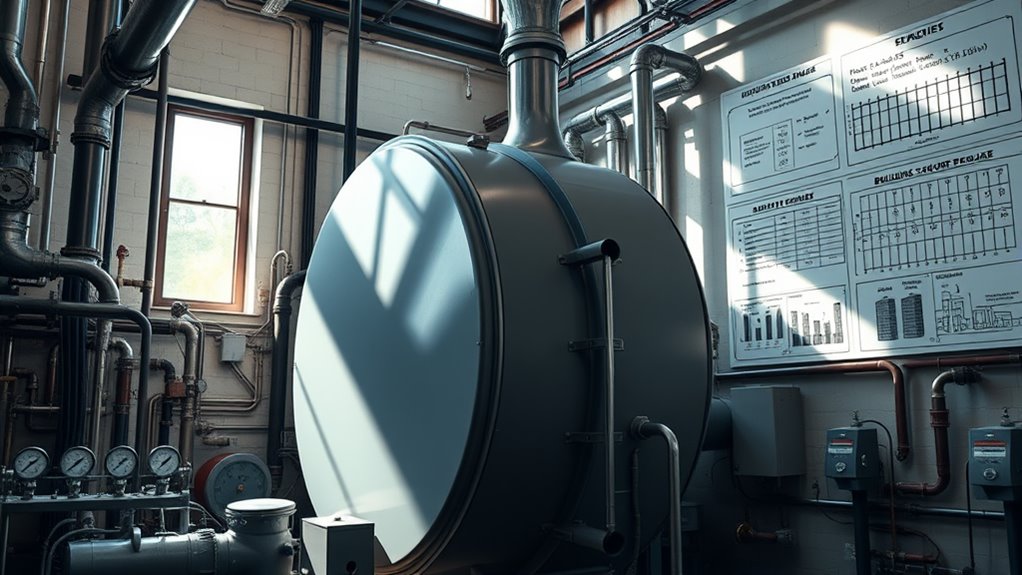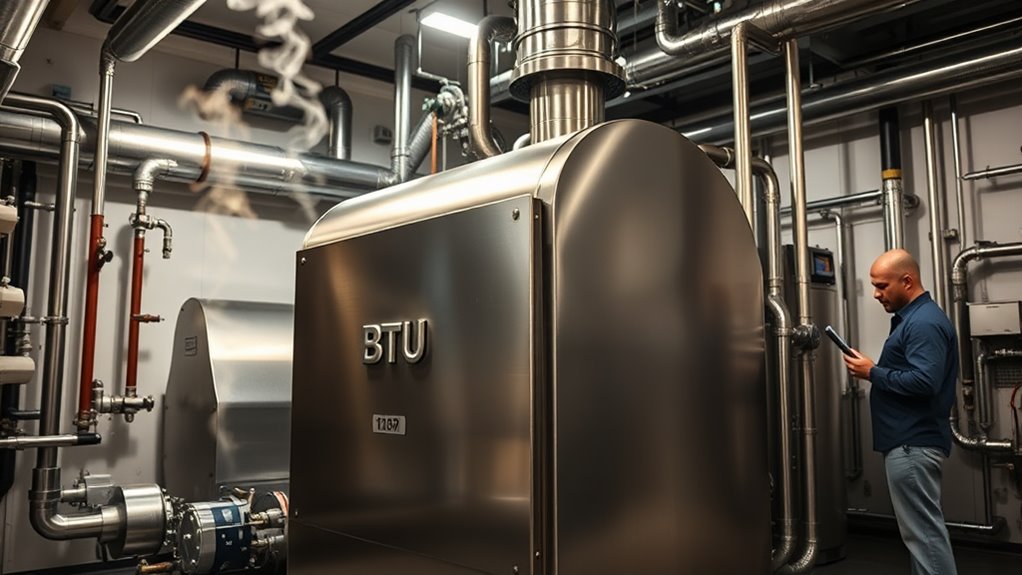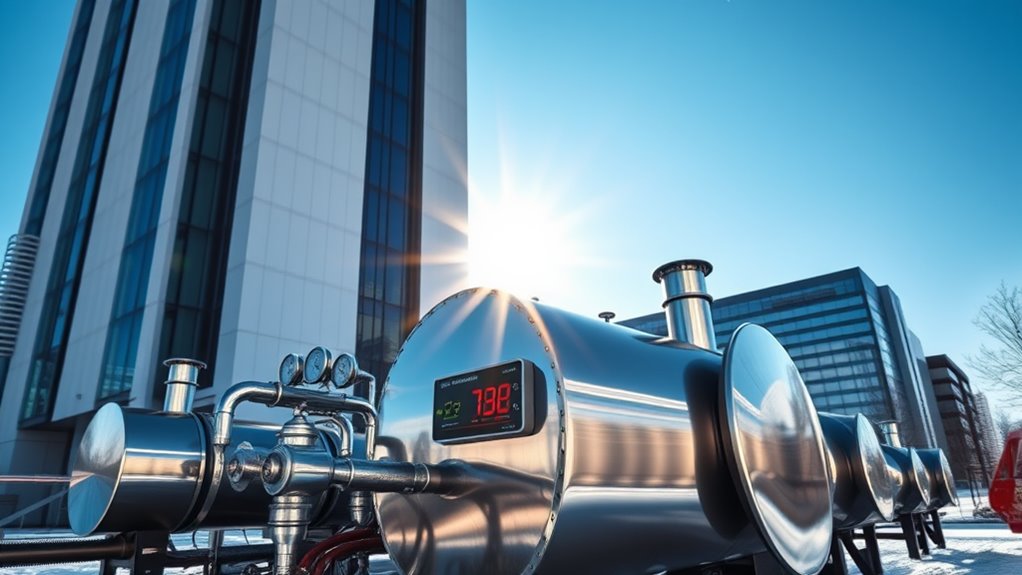To determine the right boiler size for your commercial building, consider several factors. Evaluate the building size, insulation quality, and specific heating load requirements. You'll also need to account for peak heating demands during cold spells. Anticipate future expansions and changes in occupancy, which may require additional capacity. A detailed load analysis will help fine-tune your selection. Explore the intricacies of these considerations to guarantee peak performance and efficiency in your heating system.
Key insights
- Assess building size and layout to determine the necessary boiler capacity for efficient heating.
- Calculate heating load requirements, accounting for insulation, window sizes, and occupancy levels.
- Evaluate peak heating demand during the coldest periods to ensure the boiler can meet maximum requirements.
- Consider future expansion plans by sizing the boiler with an additional 10-20% capacity for growth.
- Consult with professionals for a comprehensive load analysis and energy efficiency recommendations tailored to your building's needs.
Understanding Boiler Types and Their Applications

When selecting a boiler for your commercial building, understanding the different types and their specific applications is essential. There are several boiler types, including fire-tube, water-tube, and electric boilers, each suited for distinct operational needs. Fire-tube boilers are often utilized in smaller facilities due to their compact design and efficiency. Water-tube boilers, on the other hand, excel in high-capacity applications, making them ideal for larger institutions like hospitals and universities. Electric boilers serve niche markets, offering a cleaner alternative for sites where gas supply is limited. Application examples vary widely; for instance, a fire-tube boiler might efficiently heat a retail space, while a water-tube boiler could provide steam for manufacturing processes. Understanding these distinctions aids in making an informed choice. Additionally, considering the energy-efficient heating and cooling solution that heat pumps provide can enhance overall system performance in commercial buildings.
Factors Affecting Boiler Sizing

When sizing a boiler for your commercial building, several factors come into play. You'll need to take into account the building size, the specific heating load requirements, and how usage patterns might fluctuate. Each of these elements directly influences the overall efficiency and effectiveness of your boiler system. Additionally, the selection of energy-efficient systems can significantly reduce operational costs and environmental impact.
Building Size Considerations
Understanding the size of your commercial building is essential, as it directly influences the boiler capacity you'll need to guarantee efficient heating. Consider your building layout and how it affects airflow and heat distribution. A complex layout may require a larger boiler to secure consistent temperatures throughout the space. Additionally, facility usage plays a significant role; high-occupancy areas or spaces with considerable heat loss will demand more heating capacity. Evaluating these factors allows for accurate boiler sizing, minimizing energy waste and securing peak performance. Don't overlook variations in building height and insulation quality, as these elements also impact the overall heating requirements. By thoroughly examining these aspects, you'll be better equipped to select the right boiler for your commercial needs. Furthermore, regular servicing ensures safe and efficient operation, which is crucial for maintaining optimal boiler performance.
Heating Load Requirements
Building size considerations lay the groundwork for determining your heating load requirements, which are pivotal in selecting the right boiler. To accurately assess your heating load, you'll need to account for various factors, including insulation quality, window sizes, and the building's layout. A detailed heat loss calculation helps guarantee that your boiler's capacity aligns with these factors, maximizing heating efficiency. Overestimating can lead to increased operational costs and diminished energy savings, while underestimating can result in inadequate heating. Additionally, consider the local climate and any potential future expansions of the building. By analyzing these elements, you can select a boiler that not only meets your current needs but also optimizes performance for long-term energy efficiency and cost-effectiveness. Regular maintenance, such as commercial power flushing, is also essential to ensure your heating system operates efficiently over time.
Usage Patterns Analysis
As you analyze usage patterns in your commercial building, it's crucial to recognize how these patterns directly impact boiler sizing. Understanding usage trends helps you determine peak demand times, allowing for more accurate calculations of heating requirements. For instance, if your building experiences fluctuating occupancy rates, your boiler must accommodate these variations efficiently. Additionally, consider the energy efficiency of your existing systems. A boiler that aligns with your usage patterns can optimize performance and reduce operational costs. By tracking daily and seasonal usage, you can identify the necessary boiler capacity to meet your building's needs without excessive oversizing. This proactive approach guarantees that your investment in a boiler maximizes energy efficiency while providing consistent heating throughout your facility. Regular preventative maintenance of your boiler also ensures it operates at peak efficiency, further aiding in energy cost reduction.
Calculating Heat Loss for Your Building

To accurately size your boiler, you must first calculate the heat loss of your building. Building insulation factors and climate considerations play critical roles in this assessment, as they influence how much heat escapes and how much you'll need to maintain a comfortable environment. By understanding these elements, you can make informed decisions about your heating needs. Additionally, a thorough site assessment can help to pinpoint specific requirements and ensure optimal boiler selection.
Building Insulation Factors
When determining the appropriate boiler size for your commercial building, understanding insulation factors is essential, since inadequate insulation can lead to notable heat loss. Start by evaluating the insulation materials used in your building. High-quality insulation enhances energy efficiency by minimizing thermal transfer. Check for gaps, cracks, or damp areas that could compromise insulation effectiveness. Each material, whether fiberglass, foam, or cellulose, has different R-values, which indicate resistance to heat flow. Calculate the overall heat loss by considering the building's size, layout, and insulation quality. This analysis will help you identify the necessary boiler capacity to maintain comfortable indoor temperatures while optimizing energy efficiency. Proper insulation notably reduces energy costs and improves your building's overall performance. Regular maintenance of the boiler, including monitoring for low water pressure, can also contribute to its efficiency and longevity.
Climate Considerations
Understanding climate considerations is essential for accurately calculating heat loss in your building. Different climate zones greatly impact the heating requirements due to varying temperature extremes and seasonal variations. To determine your building's heat loss, assess local weather patterns, including the lowest expected temperatures during winter months. This data helps you calculate the necessary thermal energy to maintain a comfortable indoor environment.
Additionally, consider factors like wind exposure and humidity, as these can influence heat retention. By factoring in these climate-related elements, you can verify your boiler is appropriately sized, optimizing energy efficiency and comfort. Incorporating this knowledge into your calculations will lead to a more effective heating solution tailored to your specific building needs. Regular maintenance and servicing of your boiler can also prevent potential issues and ensure efficient operation.
The Role of BTUs in Boiler Sizing

BTUs, or British Thermal Units, are essential in determining the appropriate size of a boiler for your commercial building. Understanding BTU calculations helps guarantee that your boiler can meet the required heat output efficiently. Here are four critical factors to take into account:
- Building Size: Calculate the total square footage to estimate the necessary BTUs.
- Insulation Quality: Poor insulation increases heat loss, requiring a higher BTU output.
- Occupancy Levels: More occupants generate additional heat, influencing your BTU needs.
- Usage Patterns: Assess peak demand times to guarantee your boiler can handle fluctuating requirements. Additionally, consider the potential for E37 error disruption due to inadequate sizing, which can impact heating efficiency.
Considering Peak Heating Demand

Peak heating demand plays an essential role in determining the appropriate boiler size for your commercial building. It refers to the maximum heating load your space requires during the coldest periods, making it vital for sizing. To accurately assess peak demand, consider factors such as the building's layout, occupancy, and usage patterns. A boiler that's too small will struggle to meet this demand, leading to inadequate heating and reduced heating efficiency. Conversely, an oversized boiler can result in short cycling, wasting energy and increasing operational costs. By accurately calculating peak demand, you can select a boiler that not only meets your needs but also enhances overall heating efficiency, ensuring ideal performance throughout the heating season. Additionally, understanding error codes can help in monitoring the boiler's performance and identifying issues before they escalate.
Evaluating Building Insulation and Air Leakage
When evaluating the appropriate boiler size for your commercial building, it is crucial to assess both insulation quality and air leakage. Poor insulation and high air infiltration can greatly increase your heating demands, leading to inefficient boiler performance. Consider these factors:
- Insulation Materials: Identify the types of insulation materials used in your building. Better materials enhance thermal performance.
- Air Infiltration Points: Check for gaps around windows, doors, and vents where air might leak, compromising efficiency.
- Building Envelope: Evaluate the overall integrity of the building envelope, including walls and roofs, for weaknesses.
- Energy Audits: Conduct an energy audit to quantify heat loss and pinpoint areas needing improvement.
Accounting for Future Expansion and Changes
As your commercial building grows or undergoes changes, it is essential to factor in potential future heating demands when sizing your boiler. Anticipating future needs guarantees that you won't outgrow your heating system shortly after installation. Consider any expansion plans you have; additional space typically requires more heating capacity. Evaluate the potential increase in occupancy, equipment, and operational hours that may arise from your business growth. It's wise to size your boiler to accommodate at least 10-20% more capacity than your current requirements to handle these changes effectively. This proactive approach not only saves you from costly upgrades later but also enhances energy efficiency and operational reliability, ultimately supporting your building's long-term success.
Consulting With Professionals for Accurate Sizing
Planning for future growth is only part of the equation; consulting with professionals can greatly enhance the accuracy of your boiler sizing. Engaging with boiler professionals guarantees you avoid common pitfalls and optimize your heating system's efficiency. Here are four key benefits of professional consultation:
- Comprehensive Load Analysis: Professionals assess your building's specific heating demands.
- Energy Efficiency Recommendations: They provide insights into energy-efficient models and technologies.
- System Design Expertise: Experts tailor the boiler system design to your unique operational needs.
- Compliance Assurance: Professionals verify your system meets local regulations and safety standards.
Frequently Asked Questions
How Often Should I Service My Commercial Boiler?
You should service your commercial boiler at least once a year to guarantee peak performance and safety. Regular boiler maintenance helps identify potential issues before they escalate, reducing downtime and costly repairs. Depending on usage and manufacturer recommendations, you might need to take into account more frequent service. Keeping track of service frequency is essential for compliance and efficiency, so make a schedule and stick to it for the best results.
What Are the Signs of an Undersized Boiler?
If you notice inconsistent heating or frequent cycling, your boiler efficiency might be compromised due to undersizing. When the heating demand exceeds your boiler's capacity, it struggles to maintain desired temperatures, leading to higher energy bills. You may also experience longer heating times and insufficient hot water supply. Additionally, listen for unusual noises, which can indicate stress on the system. Monitoring these signs helps guarantee your boiler meets your facility's requirements effectively.
Can I Use Multiple Smaller Boilers Instead of One Large Unit?
Yes, you can use multiple smaller boilers instead of one large unit. This approach can enhance boiler efficiency by allowing for better load management. However, consider the installation costs; multiple units may require more complex piping and controls, potentially increasing your upfront expenses. Additionally, smaller boilers can provide redundancy, ensuring that if one fails, others can still meet demand, which can be essential for continuous operation in commercial settings.
What Fuel Options Are Available for Commercial Boilers?
When considering fuel options for commercial boilers, you've got several choices. Natural gas is popular for its efficiency and lower emissions. Oil boilers offer a reliable alternative, while electric heating systems are ideal for facilities needing minimal maintenance. Biomass options, utilizing organic materials, present a sustainable choice. Propane systems serve well in areas lacking natural gas, and coal boilers, though less common today, still provide a viable energy source in specific applications.
How Long Does a Commercial Boiler Typically Last?
A commercial boiler typically lasts between 15 to 30 years, depending on factors like usage and maintenance. To maximize your boiler lifespan, conduct regular inspections and follow maintenance tips, such as flushing the system and checking for leaks. Keeping components clean and addressing issues promptly can prevent costly breakdowns and extend longevity. By being proactive, you not only enhance efficiency but also guarantee your boiler serves you well for years to come.
Summary
In conclusion, accurately sizing a boiler for your commercial building is essential for efficiency and comfort. By understanding boiler types, evaluating heat loss, and considering factors like insulation and future needs, you can determine the appropriate BTU output. Don't hesitate to consult with professionals to guarantee you make informed decisions. A properly sized boiler not only enhances performance but also minimizes operational costs, making sure your investment pays off in the long run.

